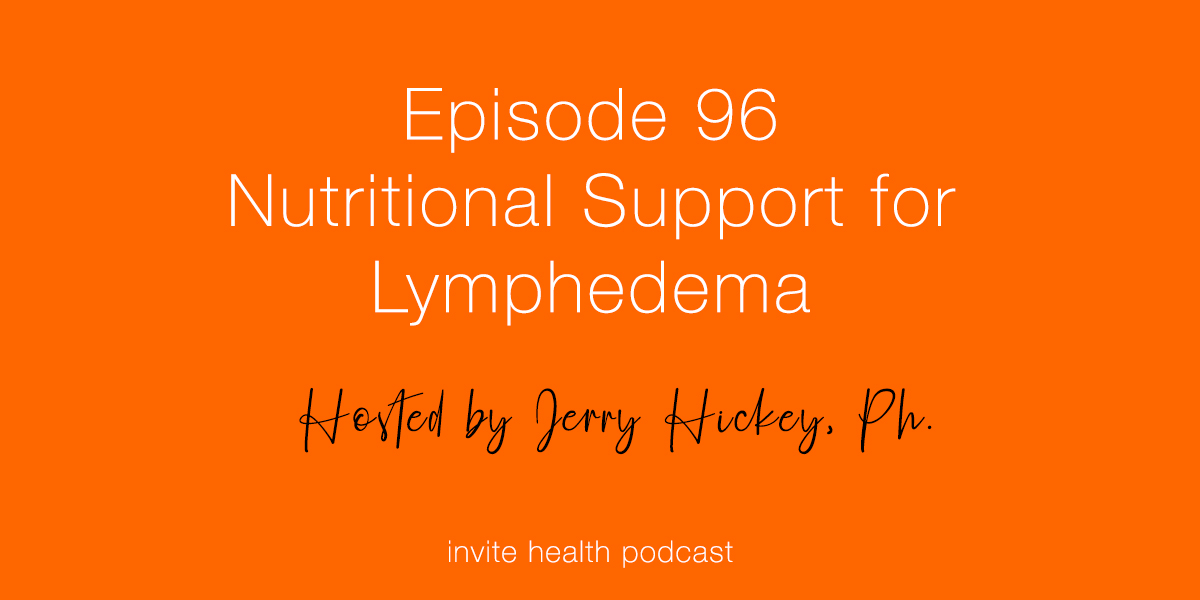Nutritional Support for Lymphedema – Invite Health Podcast, Episode 96

Invite Health Podcast, Episode hosted by Jerry Hickey. Ph
Subscribe Today!
It’s common for a person to develop swelling after surgery, an injury, and sometimes an infection. Sometimes the swelling is both progressive and persistent; a condition called lymphedema. This swelling is due to an influx of lymph fluid. Lymph fluid is found in your lymphatic system; a sort of second circulatory system which is used for detoxifying, for draining off excessive fluids, and for the immune system – to move immune cells quickly and efficiently throughout your body.
The Lymphatic System
Your lymphatic system is crucial to keeping your body healthy. It circulates lymph throughout your body, collecting bacteria, viruses, excess fluid and the waste products from your organs and cells. The lymph is a thin, clear fluid containing white blood cells. It is normally used to bathe our tissues and then is drained off through the lymphatic system eventually being returned back into our blood stream.
Your lymphatic system carries this fluid and the harmful substances through your lymph vessels, which lead to lymph nodes. Within the nodes, the wastes are then filtered out by lymphocytes — infection-fighting cells that live in your lymph nodes — and the microorganisms and toxins are ultimately flushed from your body.
Lymphedema occurs when your lymph vessels are unable to adequately drain lymph fluid, usually from an arm or a leg and you develop swelling of this part of your body. Lymphedema is most commonly caused by the removal of or damage to your lymph nodes as a part of cancer treatment including radiation or surgery.
It results from a blockage in your lymphatic system, which is part of your immune system. The blockage prevents lymph fluid from draining well, and the fluid buildup leads to swelling. There currently is no cure for lymphedema, but it can be managed.

Why is Treatment Important for Lymphedema?
Lymphedema treatment is important because of its progressive nature. It tends to get worse without treatment and as it worsens it can lead to significant disability and disfigurement; your limb can swell up like a balloon. With an advanced case ulcers and infections can occur. The larger your limb swells, the harder it is to manage your condition, and the more resistant your condition becomes to treatment. Symptoms of Lymphedema include:
- Symptoms may range from mild, hardly noticeable swelling to severe form that affects movement.
- Swelling of a part of or even the entire arm, including fingers
- Swelling of a part of or even the entire leg, including toes
- Feeling of heaviness or tightness in arms and legs
- Reduced ability to move the hands and legs
- Aching or discomfort in the affected limbs
- Increased frequency of infections
- Hardening and thickening of the skin (fibrosis)
There are many different causes for the swelling of lymphedema but those causes can be broadly broken down into three categories: inherited, traumatic, and infectious. Injury or post-surgical lymphedema is commonly seen after an aggressive life-saving surgical removal of all the lymph nodes draining a body part with cancer. Infectious lymphedema is more common in tropical environments were parasites are common.
The abnormal swelling of lymphedema is often connected with breast cancer treatment. It can develop in the arm, hand, breast, or torso as a side effect of breast cancer surgery and also from radiation therapy. Lymphedema can appear in some people during the months or even years after treatment ends.
Nutritional Support
Benzopyrones are found in the skin of citrus fruits. They are sort of like flavonoids that have been shown to help with lymphedema in a number of studies. Diosmin is one and Rutin is another used for circulatory issues.
A six month study performed on 104 women with lymphedema by their arm after breast cancer treatment using Daflon 500mg – a citrus skin fruit extract – from the Journal Oncology by the Department of Nuclear Medicine Centre in France. They were checking the swelling of the arm every two months and they should that it helped women with severe lymphadema greatly.
In a similar study from academic research institutions and hospitals throughout Italy, participants that had hip or knee replacement surgery were given a combination of flavonoids from citrus fruits, berries and grape seed extract. After 30 days, there was a real improvement in the swelling – a 5% improvement in the swelling of the ankle area and a 3% improvement in the swelling of the calve area. Participants on placebo showed no improvement. The research states that the compound was effective in reducing swelling after major orthopedic surgery and that it helped “reduce the symptoms of pain, itching and burning.”
Questions about Lymphadema? Leave a comment below to join the discussion.
Thank you for tuning in to the Invite Health Podcast. You can find all of our episodes for free wherever you listen to podcasts or by visiting www.invitehealth.com/podcast. Make sure you subscribe and leave us a review! Follow us on Facebook, Twitter and Instagram at Invite Health today. We’ll see you next time on another episode of the Invite Health Podcast.


Thanks for the podcast on lymphedema
and the information about supplements to help reduce the swelling. I have struggled to find help to maintain a healthy weight I have gained almost 100 pounds since my lymp. started.
I recently read about full body vibration to help reduce the swelling
have you heard about this?
Regards,
Hi Marg,
I am not familiar with full body vibration fore treating lymphedema. Is the weight gain from fat build up or from fluid build up due to lymphedema? Please send me an email directly at JHickey@invitehealth.com to discuss this further!
Jerry Hickey Ph